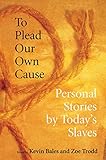To Plead Our Own Cause : Personal Stories by Today's Slaves / ed. by Kevin Bales, Zoe Trodd.
Material type: TextPublisher: Ithaca, NY : Cornell University Press, [2010]Copyright date: 2010Description: 1 online resource (272 p.) : 16 halftonesContent type:
TextPublisher: Ithaca, NY : Cornell University Press, [2010]Copyright date: 2010Description: 1 online resource (272 p.) : 16 halftonesContent type: - 9780801445736
- 9780801458323
- 306.3/62 22
- online - DeGruyter
| Item type | Current library | Call number | URL | Status | Notes | Barcode | |
|---|---|---|---|---|---|---|---|
 eBook
eBook
|
Biblioteca "Angelicum" Pont. Univ. S.Tommaso d'Aquino Nuvola online | online - DeGruyter (Browse shelf(Opens below)) | Online access | Not for loan (Accesso limitato) | Accesso per gli utenti autorizzati / Access for authorized users | (dgr)9780801458323 |
Frontmatter -- CONTENTS -- ACKNOWLEDGMENTS -- INTRODUCTION -- 1. Sights and Scenes: Modern Slave Experiences -- 2. Ain’t I a Woman? Female Slaves and the Dynamics of Gender -- 3. The Turning Point: Liberation from Bondage -- 4. Not Yet Realized: The Problem of Freedom -- 5. The Severed Chain: Freedom after Bondage -- Appendix: Antislavery Organizations and Agencies -- Permissions and Credits -- Index
restricted access online access with authorization star
http://purl.org/coar/access_right/c_16ec
Boys strapped to carpet looms in India, women trafficked into sex slavery across Europe, children born into bondage in Mauritania, and migrants imprisoned at gunpoint in the United States are just a few of the many forms slavery takes in the twenty-first century. There are twenty-seven million slaves alive today, more than at any point in history, and they are found on every continent in the world except Antarctica. To Plead Our Own Cause contains ninety-five narratives by slaves and former slaves from around the globe. Told in the words of slaves themselves, the narratives movingly and eloquently chronicle the horrors of contemporary slavery, the process of becoming free, and the challenges faced by former slaves as they build a life in freedom. An editors' introduction lays out the historical, economic, and political background to modern slavery, the literary tradition of the slave narrative, and a variety of ways we can all help end slavery today. Halting the contemporary slave trade is one of the great human-rights issues of our time. But just as slavery is not over, neither is the will to achieve freedom, "plead" the cause of liberation, and advocate abolition. Putting the slave's voice back at the heart of the abolitionist movement, To Plead Our Own Cause gives occasion for both action and hope.
Mode of access: Internet via World Wide Web.
In English.
Description based on online resource; title from PDF title page (publisher's Web site, viewed 20. Nov 2024)


